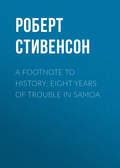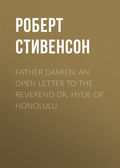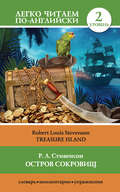
Роберт Льюис Стивенсон
The Black Arrow
BOOK V–CROOKBACK
CHAPTER I – THE SHRILL TRUMPET
Very early the next morning, before the first peep of the day, Dick arose, changed his garments, armed himself once more like a gentleman, and set forth for Lawless’s den in the forest. There, it will be remembered, he had left Lord Foxham’s papers; and to get these and be back in time for the tryst with the young Duke of Gloucester could only be managed by an early start and the most vigorous walking.
The frost was more rigorous than ever; the air windless and dry, and stinging to the nostril. The moon had gone down, but the stars were still bright and numerous, and the reflection from the snow was clear and cheerful. There was no need for a lamp to walk by; nor, in that still but ringing air, the least temptation to delay.
Dick had crossed the greater part of the open ground between Shoreby and the forest, and had reached the bottom of the little hill, some hundred yards below the Cross of St. Bride, when, through the stillness of the black morn, there rang forth the note of a trumpet, so shrill, clear, and piercing, that he thought he had never heard the match of it for audibility. It was blown once, and then hurriedly a second time; and then the clash of steel succeeded.
At this young Shelton pricked his ears, and drawing his sword, ran forward up the hill.
Presently he came in sight of the cross, and was aware of a most fierce encounter raging on the road before it. There were seven or eight assailants, and but one to keep head against them; but so active and dexterous was this one, so desperately did he charge and scatter his opponents, so deftly keep his footing on the ice, that already, before Dick could intervene, he had slain one, wounded another, and kept the whole in check.
Still, it was by a miracle that he continued his defence, and at any moment, any accident, the least slip of foot or error of hand, his life would be a forfeit.
“Hold ye well, sir! Here is help!” cried Richard; and forgetting that he was alone, and that the cry was somewhat irregular, “To the Arrow! to the Arrow!” he shouted, as he fell upon the rear of the assailants.
These were stout fellows also, for they gave not an inch at this surprise, but faced about, and fell with astonishing fury upon Dick. Four against one, the steel flashed about him in the starlight; the sparks flew fiercely; one of the men opposed to him fell – in the stir of the fight he hardly knew why; then he himself was struck across the head, and though the steel cap below his hood protected him, the blow beat him down upon one knee, with a brain whirling like a windmill sail.
Meanwhile the man whom he had come to rescue, instead of joining in the conflict, had, on the first sign of intervention, leaped aback and blown again, and yet more urgently and loudly, on that same shrill-voiced trumpet that began the alarm. Next moment, indeed, his foes were on him, and he was once more charging and fleeing, leaping, stabbing, dropping to his knee, and using indifferently sword and dagger, foot and hand, with the same unshaken courage and feverish energy and speed.
But that ear-piercing summons had been heard at last. There was a muffled rushing in the snow; and in a good hour for Dick, who saw the sword-points glitter already at his throat, there poured forth out of the wood upon both sides a disorderly torrent of mounted men-at-arms, each cased in iron, and with visor lowered, each bearing his lance in rest, or his sword bared and raised, and each carrying, so to speak, a passenger, in the shape of an archer or page, who leaped one after another from their perches, and had presently doubled the array.
The original assailants; seeing themselves outnumbered and surrounded, threw down their arms without a word.
“Seize me these fellows!” said the hero of the trumpet; and when his order had been obeyed, he drew near to Dick and looked him in the face.
Dick, returning this scrutiny, was surprised to find in one who had displayed such strength, skill and energy, a lad no older than himself – slightly deformed, with one shoulder higher than the other, and of a pale, painful, and distorted countenance.[2] The eyes, however, were very clear and bold.
“Sir,” said this lad, “ye came in good time for me, and none too early.”
“My lord,” returned Dick, with a faint sense that he was in the presence of a great personage, “ye are yourself so marvellous a good swordsman that I believe ye had managed them single-handed. Howbeit, it was certainly well for me that your men delayed no longer than they did.”
“How knew ye who I was?” demanded the stranger.
“Even now, my lord,” Dick answered, “I am ignorant of whom I speak with.”
“Is it so?” asked the other. “And yet ye threw yourself head first into this unequal battle.”
“I saw one man valiantly contending against many,” replied Dick, “and I had thought myself dishonoured not to bear him aid.”
A singular sneer played about the young nobleman’s mouth as he made answer:
“These are very brave words. But to the more essential – are ye Lancaster or York?”
“My lord, I make no secret; I am clear for York,” Dick answered.
“By the mass!” replied the other, “it is well for you.”
And so saying, he turned towards one of his followers.
“Let me see,” he continued, in the same sneering and cruel tones – “let me see a clean end of these brave gentlemen. Truss me them up.”
There were but five survivors of the attacking party. Archers seized them by the arms; they were hurried to the borders of the wood, and each placed below a tree of suitable dimension; the rope was adjusted; an archer, carrying the end of it, hastily clambered overhead; and before a minute was over, and without a word passing upon either hand, the five men were swinging by the neck.
“And now,” cried the deformed leader, “back to your posts, and when I summon you next, be readier to attend.”
“My lord duke,” said one man, “beseech you, tarry not here alone. Keep but a handful of lances at your hand.”
“Fellow,” said the duke, “I have forborne to chide you for your slowness. Cross me not, therefore. I trust my hand and arm, for all that I be crooked. Ye were backward when the trumpet sounded; and ye are now too forward with your counsels. But it is ever so; last with the lance and first with tongue. Let it be reversed.”
And with a gesture that was not without a sort of dangerous nobility, he waved them off.
The footmen climbed again to their seats behind the men-at-arms, and the whole party moved slowly away and disappeared in twenty different directions, under the cover of the forest.
The day was by this time beginning to break, and the stars to fade. The first grey glimmer of dawn shone upon the countenances of the two young men, who now turned once more to face each other.
“Here,” said the duke, “ye have seen my vengeance, which is, like my blade, both sharp and ready. But I would not have you, for all Christendom, suppose me thankless. You that came to my aid with a good sword and a better courage – unless that ye recoil from my misshapenness – come to my heart.”
And so saying, the young leader held out his arms for an embrace.
In the bottom of his heart Dick already entertained a great terror and some hatred for the man whom he had rescued; but the invitation was so worded that it would not have been merely discourteous, but cruel, to refuse or hesitate; and he hastened to comply.
“And now, my lord duke,” he said, when he had regained his freedom, “do I suppose aright? Are ye my Lord Duke of Gloucester?”
“I am Richard of Gloucester,” returned the other. “And you – how call they you?”
Dick told him his name, and presented Lord Foxham’s signet, which the duke immediately recognised.
“Ye come too soon,” he said; “but why should I complain? Ye are like me, that was here at watch two hours before the day. But this is the first sally of mine arms; upon this adventure, Master Shelton, shall I make or mar the quality of my renown. There lie mine enemies, under two old, skilled captains – Risingham and Brackley – well posted for strength, I do believe, but yet upon two sides without retreat, enclosed betwixt the sea, the harbour, and the river. Methinks, Shelton, here were a great blow to be stricken, an we could strike it silently and suddenly.”
“I do think so, indeed,” cried Dick, warming.
“Have ye my Lord Foxham’s notes?” inquired the duke.
And then, Dick, having explained how he was without them for the moment, made himself bold to offer information every jot as good, of his own knowledge. “And for mine own part, my lord duke,” he added, “an ye had men enough, I would fall on even at this present. For, look ye, at the peep of day the watches of the night are over; but by day they keep neither watch nor ward – only scour the outskirts with horsemen. Now, then, when the night watch is already unarmed, and the rest are at their morning cup – now were the time to break them.”
“How many do ye count?” asked Gloucester.
“They number not two thousand,” Dick replied.
“I have seven hundred in the woods behind us,” said the duke; “seven hundred follow from Kettley, and will be here anon; behind these, and further, are four hundred more; and my Lord Foxham hath five hundred half a day from here, at Holywood. Shall we attend their coming, or fall on?”
“My lord,” said Dick, “when ye hanged these five poor rogues ye did decide the question. Churls although they were, in these uneasy, times they will be lacked and looked for, and the alarm be given. Therefore, my lord, if ye do count upon the advantage of a surprise, ye have not, in my poor opinion, one whole hour in front of you.”
“I do think so indeed,” returned Crookback. “Well, before an hour, ye shall be in the thick on’t, winning spurs. A swift man to Holywood, carrying Lord Foxham’s signet; another along the road to speed my laggards! Nay, Shelton, by the rood, it may be done!”
Therewith he once more set his trumpet to his lips and blew.
This time he was not long kept waiting. In a moment the open space about the cross was filled with horse and foot. Richard of Gloucester took his place upon the steps, and despatched messenger after messenger to hasten the concentration of the seven hundred men that lay hidden in the immediate neighbourhood among the woods; and before a quarter of an hour had passed, all his dispositions being taken, he put himself at their head, and began to move down the hill towards Shoreby.
His plan was simple. He was to seize a quarter of the town of Shoreby lying on the right hand of the high road, and make his position good there in the narrow lanes until his reinforcements followed.
If Lord Risingham chose to retreat, Richard would follow upon his rear, and take him between two fires; or, if he preferred to hold the town, he would be shut in a trap, there to be gradually overwhelmed by force of numbers.
There was but one danger, but that was imminent and great – Gloucester’s seven hundred might be rolled up and cut to pieces in the first encounter, and, to avoid this, it was needful to make the surprise of their arrival as complete as possible.
The footmen, therefore, were all once more taken up behind the riders, and Dick had the signal honour meted out to him of mounting behind Gloucester himself. For as far as there was any cover the troops moved slowly, and when they came near the end of the trees that lined the highway, stopped to breathe and reconnoitre.
The sun was now well up, shining with a frosty brightness out of a yellow halo, and right over against the luminary, Shoreby, a field of snowy roofs and ruddy gables, was rolling up its columns of morning smoke. Gloucester turned round to Dick.
“In that poor place,” he said, “where people are cooking breakfast, either you shall gain your spurs and I begin a life of mighty honour and glory in the world’s eye, or both of us, as I conceive it, shall fall dead and be unheard of. Two Richards are we. Well, then, Richard Shelton, they shall be heard about, these two! Their swords shall not ring more loudly on men’s helmets than their names shall ring in people’s ears.”
Dick was astonished at so great a hunger after fame, expressed with so great vehemence of voice and language, and he answered very sensibly and quietly, that, for his part, he promised he would do his duty, and doubted not of victory if everyone did the like.
By this time the horses were well breathed, and the leader holding up his sword and giving rein, the whole troop of chargers broke into the gallop and thundered, with their double load of fighting men, down the remainder of the hill and across the snow-covered plain that still divided them from Shoreby.
CHAPTER II – THE BATTLE OF SHOREBY
The whole distance to be crossed was not above a quarter of a mile. But they had no sooner debauched beyond the cover of the trees than they were aware of people fleeing and screaming in the snowy meadows upon either hand. Almost at the same moment a great rumour began to arise, and spread and grow continually louder in the town; and they were not yet halfway to the nearest house before the bells began to ring backward from the steeple.
The young duke ground his teeth together. By these so early signals of alarm he feared to find his enemies prepared; and if he failed to gain a footing in the town, he knew that his small party would soon be broken and exterminated in the open.
In the town, however, the Lancastrians were far from being in so good a posture. It was as Dick had said. The night-guard had already doffed their harness; the rest were still hanging – unlatched, unbraced, all unprepared for battle – about their quarters; and in the whole of Shoreby there were not, perhaps, fifty men full armed, or fifty chargers ready to be mounted.
The beating of the bells, the terrifying summons of men who ran about the streets crying and beating upon the doors, aroused in an incredibly short space at least two score out of that half hundred. These got speedily to horse, and, the alarm still flying wild and contrary, galloped in different directions.
Thus it befell that, when Richard of Gloucester reached the first house of Shoreby, he was met in the mouth of the street by a mere handful of lances, whom he swept before his onset as the storm chases the bark.
A hundred paces into the town, Dick Shelton touched the duke’s arm; the duke, in answer, gathered his reins, put the shrill trumpet to his mouth, and blowing a concerted point, turned to the right hand out of the direct advance. Swerving like a single rider, his whole command turned after him, and, still at the full gallop of the chargers, swept up the narrow bye-street. Only the last score of riders drew rein and faced about in the entrance; the footmen, whom they carried behind them, leapt at the same instant to the earth, and began, some to bend their bows, and others to break into and secure the houses upon either hand.
Surprised at this sudden change of direction, and daunted by the firm front of the rear-guard, the few Lancastrians, after a momentary consultation, turned and rode farther into town to seek for reinforcements.
The quarter of the town upon which, by the advice of Dick, Richard of Gloucester had now seized, consisted of five small streets of poor and ill-inhabited houses, occupying a very gentle eminence, and lying open towards the back.
The five streets being each secured by a good guard, the reserve would thus occupy the centre, out of shot, and yet ready to carry aid wherever it was needed.
Such was the poorness of the neighbourhood that none of the Lancastrian lords, and but few of their retainers, had been lodged therein; and the inhabitants, with one accord, deserted their houses and fled, squalling, along the streets or over garden walls.
In the centre, where the five ways all met, a somewhat ill-favoured alehouse displayed the sign of the Chequers; and here the Duke of Gloucester chose his headquarters for the day.
To Dick he assigned the guard of one of the five streets.
“Go,” he said, “win your spurs. Win glory for me: one Richard for another. I tell you, if I rise, ye shall rise by the same ladder. Go,” he added, shaking him by the hand.
But, as soon as Dick was gone, he turned to a little shabby archer at his elbow.
“Go, Dutton, and that right speedily,” he added. “Follow that lad. If ye find him faithful, ye answer for his safety, a head for a head. Woe unto you, if ye return without him! But if he be faithless – or, for one instant, ye misdoubt him – stab him from behind.”
In the meanwhile Dick hastened to secure his post. The street he had to guard was very narrow, and closely lined with houses, which projected and overhung the roadway; but narrow and dark as it was, since it opened upon the market-place of the town, the main issue of the battle would probably fall to be decided on that spot.
The market-place was full of townspeople fleeing in disorder; but there was as yet no sign of any foeman ready to attack, and Dick judged he had some time before him to make ready his defence.
The two houses at the end stood deserted, with open doors, as the inhabitants had left them in their flight, and from these he had the furniture hastily tossed forth and piled into a barrier in the entry of the lane. A hundred men were placed at his disposal, and of these he threw the more part into the houses, where they might lie in shelter and deliver their arrows from the windows. With the rest, under his own immediate eye, he lined the barricade.
Meanwhile the utmost uproar and confusion had continued to prevail throughout the town; and what with the hurried clashing of bells, the sounding of trumpets, the swift movement of bodies of horse, the cries of the commanders, and the shrieks of women, the noise was almost deafening to the ear. Presently, little by little, the tumult began to subside; and soon after, files of men in armour and bodies of archers began to assemble and form in line of battle in the market-place.
A large portion of this body were in murrey and blue, and in the mounted knight who ordered their array Dick recognised Sir Daniel Brackley.
Then there befell a long pause, which was followed by the almost simultaneous sounding of four trumpets from four different quarters of the town. A fifth rang in answer from the market-place, and at the same moment the files began to move, and a shower of arrows rattled about the barricade, and sounded like blows upon the walls of the two flanking houses.
The attack had begun, by a common signal, on all the five issues of the quarter. Gloucester was beleaguered upon every side; and Dick judged, if he would make good his post, he must rely entirely on the hundred men of his command.
Seven volleys of arrows followed one upon the other, and in the very thick of the discharges Dick was touched from behind upon the arm, and found a page holding out to him a leathern jack, strengthened with bright plates of mail.
“It is from my Lord of Gloucester,” said the page. “He hath observed, Sir Richard, that ye went unarmed.”
Dick, with a glow at his heart at being so addressed, got to his feet and, with the assistance of the page, donned the defensive coat. Even as he did so, two arrows rattled harmlessly upon the plates, and a third struck down the page, mortally wounded, at his feet.
Meantime the whole body of the enemy had been steadily drawing nearer across the market-place; and by this time were so close at hand that Dick gave the order to return their shot. Immediately, from behind the barrier and from the windows of the houses, a counterblast of arrows sped, carrying death. But the Lancastrians, as if they had but waited for a signal, shouted loudly in answer; and began to close at a run upon the barrier, the horsemen still hanging back, with visors lowered.
Then followed an obstinate and deadly struggle, hand to hand. The assailants, wielding their falchions with one hand, strove with the other to drag down the structure of the barricade. On the other side, the parts were reversed; and the defenders exposed themselves like madmen to protect their rampart. So for some minutes the contest raged almost in silence, friend and foe falling one upon another. But it is always the easier to destroy; and when a single note upon the tucket recalled the attacking party from this desperate service, much of the barricade had been removed piecemeal, and the whole fabric had sunk to half its height, and tottered to a general fall.
And now the footmen in the market-place fell back, at a run, on every side. The horsemen, who had been standing in a line two deep, wheeled suddenly, and made their flank into their front; and as swift as a striking adder, the long, steel-clad column was launched upon the ruinous barricade.
Of the first two horsemen, one fell, rider and steed, and was ridden down by his companions. The second leaped clean upon the summit of the rampart, transpiercing an archer with his lance. Almost in the same instant he was dragged from the saddle and his horse despatched.
And then the full weight and impetus of the charge burst upon and scattered the defenders. The men-at-arms, surmounting their fallen comrades, and carried onward by the fury of their onslaught, dashed through Dick’s broken line and poured thundering up the lane beyond, as a stream bestrides and pours across a broken dam.
Yet was the fight not over. Still, in the narrow jaws of the entrance, Dick and a few survivors plied their bills like woodmen; and already, across the width of the passage, there had been formed a second, a higher, and a more effectual rampart of fallen men and disembowelled horses, lashing in the agonies of death.
Baffled by this fresh obstacle, the remainder of the cavalry fell back; and as, at the sight of this movement, the flight of arrows redoubled from the casements of the houses, their retreat had, for a moment, almost degenerated into flight.
Almost at the same time, those who had crossed the barricade and charged farther up the street, being met before the door of the Chequers by the formidable hunchback and the whole reserve of the Yorkists, began to come scattering backward, in the excess of disarray and terror.
Dick and his fellows faced about, fresh men poured out of the houses; a cruel blast of arrows met the fugitives full in the face, while Gloucester was already riding down their rear; in the inside of a minute and a half there was no living Lancastrian in the street.
Then, and not till then, did Dick hold up his reeking blade and give the word to cheer.
Meanwhile Gloucester dismounted from his horse and came forward to inspect the post. His face was as pale as linen; but his eyes shone in his head like some strange jewel, and his voice, when he spoke, was hoarse and broken with the exultation of battle and success. He looked at the rampart, which neither friend nor foe could now approach without precaution, so fiercely did the horses struggle in the throes of death, and at the sight of that great carnage he smiled upon one side.
“Despatch these horses,” he said; “they keep you from your vantage. Richard Shelton,” he added, “ye have pleased me. Kneel.”
The Lancastrians had already resumed their archery, and the shafts fell thick in the mouth of the street; but the duke, minding them not at all, deliberately drew his sword and dubbed Richard a knight upon the spot.
“And now, Sir Richard,” he continued, “if that ye see Lord Risingham, send me an express upon the instant. Were it your last man, let me hear of it incontinently. I had rather venture the post than lose my stroke at him. For mark me, all of ye,” he added, raising his voice, “if Earl Risingham fall by another hand than mine, I shall count this victory a defeat.”
“My lord duke,” said one of his attendants, “is your grace not weary of exposing his dear life unneedfully? Why tarry we here?”
“Catesby,” returned the duke, “here is the battle, not elsewhere. The rest are but feigned onslaughts. Here must we vanquish. And for the exposure – if ye were an ugly hunchback, and the children gecked at you upon the street, ye would count your body cheaper, and an hour of glory worth a life. Howbeit, if ye will, let us ride on and visit the other posts. Sir Richard here, my namesake, he shall still hold this entry, where he wadeth to the ankles in hot blood. Him can we trust. But mark it, Sir Richard, ye are not yet done. The worst is yet to ward. Sleep not.”
He came right up to young Shelton, looking him hard in the eyes, and taking his hand in both of his, gave it so extreme a squeeze that the blood had nearly spurted. Dick quailed before his eyes. The insane excitement, the courage, and the cruelty that he read therein filled him with dismay about the future. This young duke’s was indeed a gallant spirit, to ride foremost in the ranks of war; but after the battle, in the days of peace and in the circle of his trusted friends, that mind, it was to be dreaded, would continue to bring forth the fruits of death.







